The AI Playbook: How Model, Context, and Protocol Separate Genius AI from Clunky Bots.
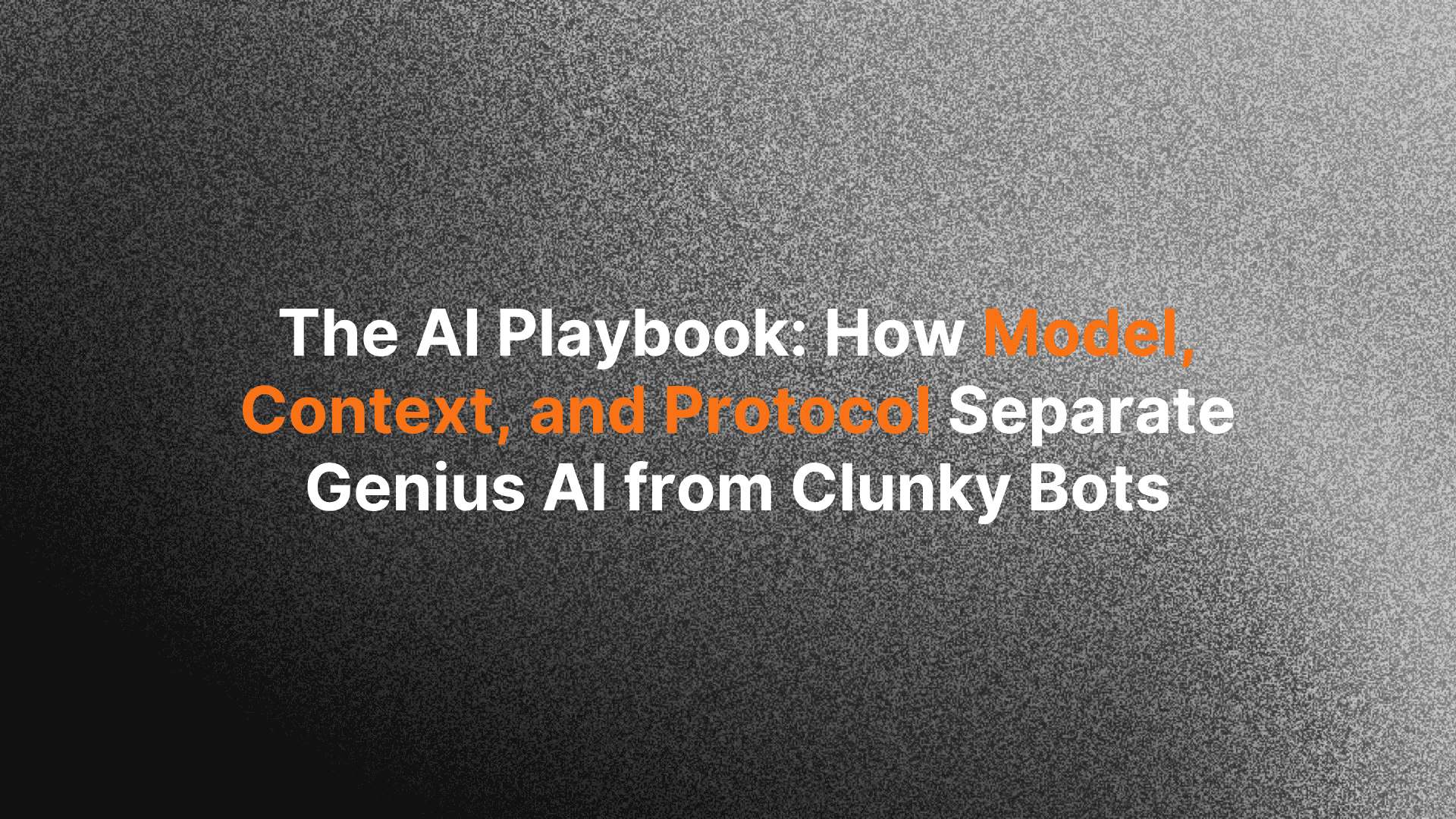
Intervo.ai helps you build smart voice agents that actually understand and act unlike clunky phone bots. Using the MCP framework (Model, Context, Protocol), you choose the AI brain and voice, upload your business docs for context, and define voice-triggered workflows that get things done. From following up on insurance leads to reminding clients about appointments, Intervo turns voice into action. Pair it with n8n for powerful backend automation, and you’ve got a fully open-source, customizable AI that feels more like a digital employee than a bot.

- The Problem: We've all suffered through robotic, frustrating phone menus (IVRs). They fail because they have a rigid script, no understanding of our situation, and no real intelligence.
- The Solution: Truly intelligent voice agents are built on the MCP Framework—a powerful Model, rich Context, and a smart Protocol.
- M is for Model: This is the core "brain" and "voice" of the AI (like OpenAI's GPT models). Intervo.ai lets you choose the best model for your needs, giving you control over the agent's intelligence and personality.
- C is for Context: This is what transforms a generic bot into a helpful expert. With Intervo.ai, you provide context by uploading your own documents and writing specific instructions, so your agent understands your business inside and out.
- P is for Protocol: These are the rules of engagement and the specific actions the AI can take. In Intervo.ai, you define the protocol with custom "Voice Commands" that trigger reliable workflows.
- The Punchline: Intervo.ai gives you the tools to build your own AI Playbook. By mastering how you combine Model, Context, and Protocol, you can create voice agents that are truly helpful, not infuriating.
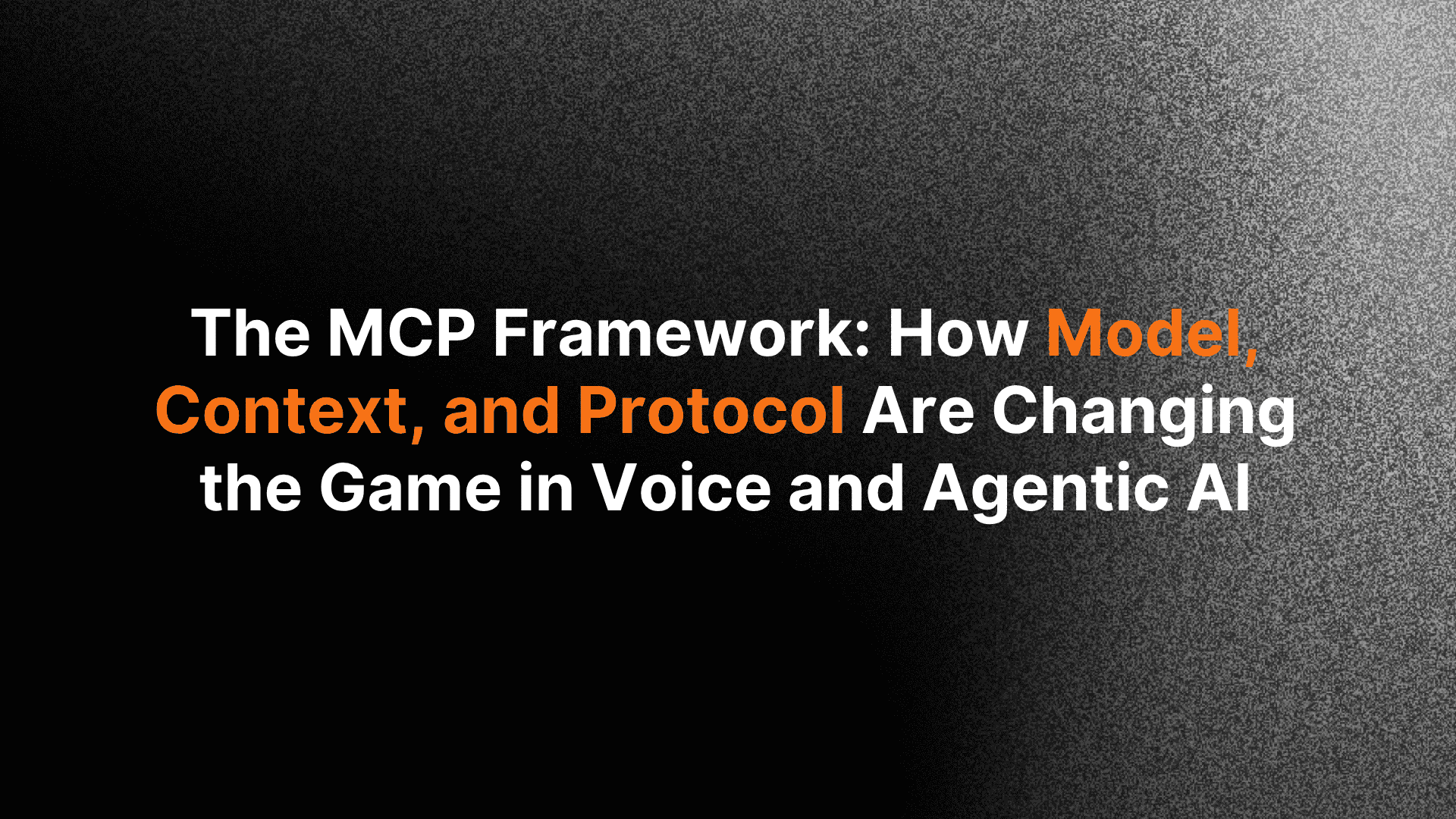
"Please Listen Carefully, as Our Menu Options Have Changed..."
You take a deep breath before making the call. You know what's coming. After navigating a maze of dial tones, you’re greeted by a cheerful, robotic voice. "Welcome to OmniCorp Support. Please say 'Billing' for billing inquiries, 'Technical Support' for technical issues, or 'Operator' to speak with an agent."
You say, "My Wi-Fi router is blinking a red light."
The voice pauses, completely ignoring what you just said. "...I'm sorry, I didn't get that. Please say 'Billing,' 'Technical Support,' or 'Operator.'"
We have all been trapped in these automated loops. This is the perfect example of a system with a broken playbook. It has a voice, but no brain. A script, but no understanding. It’s the reason so many people shudder at the thought of "automated support."
But what if you could build a voice agent that actually listened? One that understood the context of a problem and knew exactly what to do?
This is now possible, but it requires moving beyond the old, rigid scripts. It requires building a true AI Playbook. This playbook is built on three pillars that separate genius AI from clunky bots: Model, Context, and Protocol (MCP). And platforms like Intervo.ai are giving you the tools to write it yourself.
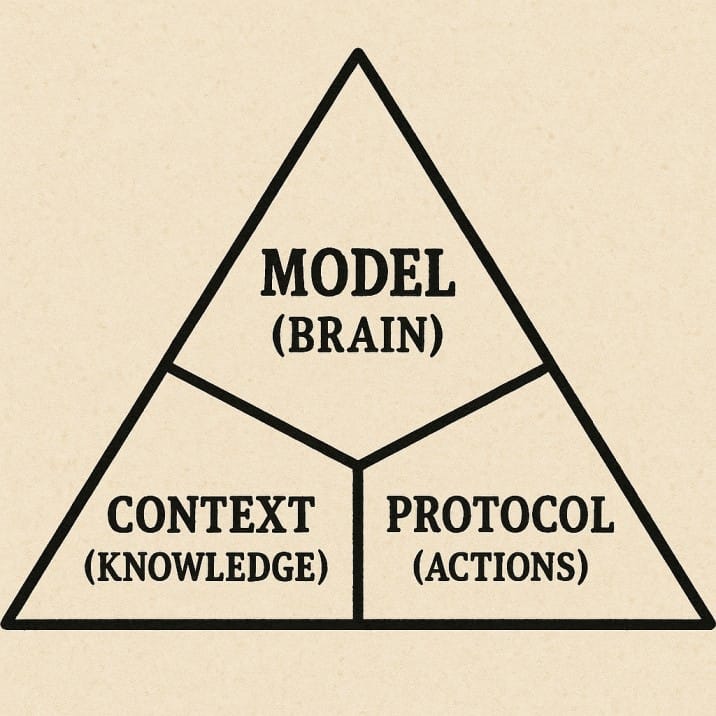
M is for Model: Choosing Your Agent's Brain and Voice
The Model is the engine of your AI agent. It consists of two parts: the Large Language Model (LLM) that provides the intelligence and reasoning, and the voice synthesis model that creates the natural-sounding speech. Think of it as the AI’s core intellect and personality.
In the past, you were stuck with whatever off-the-shelf model a vendor provided. This often meant a one-size-fits-all solution that didn’t quite fit your brand's voice or intelligence requirements.
This is where the flexibility of a platform like Intervo.ai becomes critical. You are not locked into a single "brain." You can choose to plug in powerful models from providers like OpenAI for state-of-the-art conversational ability, or you can opt for open-source alternatives that might offer more customization or cost-effectiveness. This choice allows you to select the right level of intelligence and the perfect voice to represent your business.
C is for Context: From a Blank Slate to an In-House Expert
This is the most crucial piece of the puzzle, and where most automated systems fail. Context is the AI’s awareness. It’s the rich, specific knowledge that transforms a generic chatbot into a hyper-relevant, expert assistant. An AI without context is like a new employee on their first day—they might be smart, but they don't know anything about your business or your customers.
Providing context is how you make your AI yours. This is a core design principle of Intervo.ai.
- Setting the Stage with Instructions: When you create an agent in Intervo.ai, you start by giving it "Instructions." This is where you define its persona, its role, and its goals. Is it a friendly, empathetic support agent? Or a quick, efficient order-taking bot? You set the stage for every interaction that follows.
- Creating an Expert with Your Documents: The real magic happens with the "Upload Documents" feature. You can feed your voice agent your company’s internal knowledge base, product manuals, FAQs, and policy documents. Now, when a customer asks a specific question about "the warranty on the Model X-7," the AI isn't guessing. It's retrieving the answer directly from the trusted context you provided, ensuring accuracy and reliability.
By providing this deep context, you are turning your voice agent from a generalist into a specialist—an expert on your business.
P is for Protocol: Defining the Rules and a Path to Action
If Context is the knowledge, Protocol is the playbook for how to use that knowledge. It's the set of rules that governs the conversation's flow and dictates what actions the AI can and should take. A good protocol ensures the conversation is efficient, predictable, and leads to a successful outcome.
Old IVR systems have a rigid, terrible protocol: "Press 1 for X, Press 2 for Y." It's a dead end.
A modern voice agent's protocol is dynamic and actionable. With Intervo.ai, you build this protocol using features like "Voice Commands." You can define specific phrases that trigger specific workflows.
For example, a customer saying, "I'd like to book a new appointment," can be configured as a protocol that triggers a series of actions:
- The AI asks for the desired date and time.
- It checks a connected calendar API for availability.
- It offers the open slots to the user.
- Upon confirmation, it books the appointment and sends a confirmation message.
This isn't just a conversation; it's a reliable, automated workflow. The protocol provides clear paths to action, ensuring your voice agent doesn't just talk, but does.
Building Your Playbook with Intervo.ai
Mastering the MCP framework on the Intervo.ai platform is straightforward:
- Select Your Model: Choose the "brain" that fits your budget and performance needs.
- Engineer Your Context: This is your most important job. Write clear instructions and upload every relevant document you have. The richer the context, the smarter your agent will be.
- Design Your Protocols: Identify the key actions users will want to take. Create specific Voice Commands that map to these actions and build reliable, multi-step workflows.
Real-World Playbooks: Intervo.ai Case Studies in Action
Understanding the MCP framework is the first step. Seeing it in action is where the true potential becomes clear. Here are some powerful case studies illustrating how businesses can use a platform like Intervo.ai to build their own intelligent voice agents.
1. The Insurance Assistant: Instant Follow-up for Online Forms
- The Problem: An insurance company sees a high number of potential customers fill out a detailed online form for a life insurance quote but then drop off before finalizing the purchase. Manual follow-up calls by agents are slow, often happening hours or days later when the lead has gone cold.
- The Solution: An Intervo.ai voice agent is integrated with their web form and telephony system (e.g., Twilio). The moment a user clicks "submit," an outbound call is triggered.
- MCP in Action:
- Model: Uses a professional, reassuring voice model to build immediate trust with the applicant.
- Context: The agent is instantly fed the applicant's submitted data: their name, the policy type they inquired about, and their phone number. Its instructions are to be helpful and confirm details, not to be pushy.
- Protocol:
- Introduce itself: "Hi [Name], this is the automated assistant from OmniLife Insurance calling about the quote you just requested."
- Confirm details: "I see you were interested in our 20-year term life policy. Is that correct?"
- Offer next steps: "Do you have any immediate questions I can answer from our FAQ, or would you like me to schedule a call with a licensed agent in the next 15 minutes?"
- The Outcome: The agency drastically increases its contact rate. Customers are impressed by the immediate and professional follow-up. Lead conversion rates climb by over 30%, and human agents spend their time talking to pre-qualified, engaged prospects.
2. The Academic Librarian: A Personalized Knowledge Hub
- The Problem: A university's vast digital library is a goldmine of information, but students and researchers struggle to find specific, nuanced information buried within thousands of academic papers, journals, and institutional documents. Keyword searches are often too broad or too narrow.
- The Solution: An Intervo.ai voice widget is embedded directly into the university's online portal.
- MCP in Action:
- Model: Employs an LLM capable of understanding complex, domain-specific terminology and synthesizing information.
- Context: The agent’s knowledge base is created by uploading thousands of licensed research papers, historical archives, and the entire university policy handbook.
- Protocol: A student can ask a complex question via voice, like, "What are the primary arguments against Foucault's theory of biopower in post-2010 academic journals, and which university department has published most on this?" The protocol is to search the entire knowledge base, synthesize the findings into a concise spoken summary, and cite the source documents.
- The Outcome: Research time is dramatically reduced. Students get instant, synthesized answers to complex questions. The university's knowledge becomes truly accessible, turning the portal into a genuine "knowledge hub."
3. The Data Analyst: Talking to Your Data
- The Problem: A market research firm scrapes massive amounts of data on consumer trends, but their analysts spend hours writing complex queries and manually sifting through spreadsheets to spot insights. The data is there, but accessing it is slow.
- The Solution: An internal Intervo.ai agent is connected to the firm's database. Analysts can now interact with it via a simple voice interface.
- MCP in Action:
- Model: Uses a clear, precise voice model capable of articulating numbers and trends accurately.
- Context: The agent is given access to the scraped datasets and a data dictionary that defines what each field means.
- Protocol: An analyst can simply ask, "What was the average consumer sentiment score for Brand X in the last quarter, and how does that compare to Brand Y?" The agent's protocol is to parse the natural language, translate it into a formal database query, retrieve the data, and provide a spoken summary of the insight.
- The Outcome: Data analysis becomes conversational. Analysts can explore hunches and get insights in seconds, not hours. Access to data is democratized across the team, leading to faster and more agile business intelligence.
4. The Agency Qualifier: Supercharging a Sales Team
- The Problem: A digital marketing agency generates hundreds of inbound leads, but the sales team wastes over 50% of their time on calls with prospects who are not a good fit—they lack the budget, authority, or immediate need.
- The Solution: An Intervo.ai voice agent is tasked with qualifying every new lead the moment it comes in.
- MCP in Action:
- Model: Uses an upbeat, engaging, and professional voice to make an excellent first impression.
- Context: The agent is fed the lead's form data (name, company, service of interest) and is given a clear set of qualification criteria (e.g., company size > 50 employees, budget > $5,000/month).
- Protocol: The agent's script is a qualification protocol. It asks a series of friendly questions designed to determine the lead's budget, authority, need, and timeline (BANT). If the lead meets the criteria, the protocol is to access the sales team's calendar and book a meeting instantly. If not, the protocol is to thank them and add them to a nurturing email sequence.
- The Outcome: The sales team's efficiency skyrockets. They now spend their entire day talking to highly qualified, high-intent prospects, dramatically increasing morale and conversion rates. No lead ever goes cold.
5. The Real Estate Coach: Perfecting the Sales Pitch
- The Problem: A real estate brokerage needs to train new agents on how to handle client objections and pitch properties effectively. Role-playing with busy senior agents is difficult to schedule and not scalable.
- The Solution: An internal training agent, the "AI Client," is built with Intervo.ai.
- MCP in Action:
- Model: The AI model analyzes the agent's speech for clarity, pace, and confidence.
- Context: The AI is given a specific persona (e.g., "a cautious first-time buyer") and details of a property.
- Protocol: The new agent calls the "AI Client" to practice their pitch. The AI's protocol is to raise common objections like "The price seems a bit high" or "What about the school district?" After the call, the AI provides feedback on how well the agent handled the objections.
- The Outcome: New agents can practice anytime, building their confidence in a safe environment. The brokerage achieves scalable, consistent training, leading to better-prepared and more successful agents.
6. The Service Advisor: Post-Service Feedback and Reminders
- The Problem: A car dealership struggles to get feedback after a vehicle service, and customers often forget about recommended future maintenance, leading to lost revenue.
- The Solution: An Intervo.ai agent handles both feedback and future reminders.
- MCP in Action:
- Model: A polite, customer-service-oriented voice.
- Context: The agent is connected to the service database. It knows the customer, their car, the service performed, and any future maintenance recommended by the technician.
- Protocol:
- Feedback: 24 hours after service, the agent calls to ask for a quick 1-5 rating and records any open-ended feedback.
- Reminder: Two weeks before a recommended service (e.g., tire rotation) is due, the agent calls to remind the customer and asks, "Would you like me to book an appointment for you?"
- The Outcome: The dealership dramatically increases its feedback collection, allowing them to quickly address service issues. The proactive reminders lead to a significant increase in repeat service appointments and customer loyalty.
Enterprise Playbooks: In-Depth Case Studies with Intervo.ai
Building on the AI Playbook framework, let's explore in-depth case studies that demonstrate how enterprises can leverage Intervo.ai. We will dissect the current scenario, the solution, the distinct advantages, and the future scope of each application, concluding with how it fits into a larger enterprise strategy.
Case Study 1: The Insurance Assistant (Proactive Customer Conversion)
The Current Scenario (The Problem)
An insurance carrier invests heavily in marketing to drive traffic to its online quote forms. However, the process is plagued by high cart abandonment. Customers complete the detailed form but hesitate at the final step. The current process relies on a call center team to manually follow up, but this often happens 24-48 hours later, by which time the prospect's intent has faded, or they've already been contacted by a competitor. This delay creates a massive revenue leak.
How Intervo.ai Solves the Issues
The enterprise uses Intervo.ai's self-hosted platform to deploy an AI agent that integrates directly with their web form and Twilio API. The moment a user submits a quote form, the agent initiates an outbound call. Because Intervo.ai is open-source, the company's development team can create deep, secure integrations with their proprietary CRM and underwriting systems, ensuring seamless data flow.
Key Advantages
- Immediate Engagement: Eradicates the follow-up delay, engaging customers while their intent is at its peak.
- 24/7 Availability: The AI agent operates around the clock, ensuring no lead is missed, regardless of the time zone or hour of submission.
- Scalability: Can handle thousands of simultaneous follow-up calls during peak marketing campaigns without any degradation in performance.
- Data-Rich Conversations: The agent is instantly equipped with the form data, making the call feel personal and context-aware, not cold and generic.
Core Value Proposition
Transforming lead latency into immediate, intelligent engagement to maximize conversion velocity and increase policy bind rates.
Future Scopes
Currently, the agent schedules calls with human agents. In the future, the scope will expand. The AI agent could be authorized to answer more complex underwriting questions by referencing the uploaded knowledge base in real-time. It could even pre-fill a larger portion of the official application during the call, reducing the workload for the human agent and creating a frictionless customer onboarding experience.
Enterprise Perspective & Conclusion
For an enterprise, this is more than just an automated dialer; it's the first step toward a collaborated voice ecosystem. This single-use case demonstrates the power of a truly AI agentic system that takes autonomous, value-driven action. By using an open-source platform like Intervo.ai, the enterprise retains full control over its data and workflows. They are not just automating a task; they are building a scalable, intelligent asset using the MCP framework, ensuring the agent has the right Model, is armed with customer Context, and follows a perfect conversion Protocol.
Case Study 2: The Academic Librarian (Democratizing Institutional Knowledge)
The Current Scenario (The Problem)
A major university houses petabytes of valuable data in siloed databases: research papers, historical archives, course catalogs, and complex administrative policies. Accessing this information requires navigating multiple clunky portals with basic keyword search, frustrating both students and faculty. Finding a specific, nuanced answer can take hours of manual searching.
How Intervo.ai Solves the Issues
The university's IT department deploys an Intervo.ai voice widget on its main web portal. Leveraging the platform's self-hosted nature, they create a secure environment where they can upload terabytes of proprietary academic and administrative documents. This becomes the "context" that powers the agent. Students and faculty can now ask complex, natural language questions via voice or text.
Key Advantages
- Synthesized Answers: Instead of just returning a list of links, the agent reads and understands multiple documents to provide a single, synthesized answer.
- Deep Knowledge Access: Unlocks the value of deep archives and complex documents that were previously difficult to search.
- Accessibility: Provides a voice-first interface that is invaluable for users with disabilities and enhances convenience for everyone.
- Reduced Administrative Load: The agent can answer thousands of common policy and registration questions, freeing up administrative staff.
Core Value Proposition
Unlocking the total value of institutional knowledge by providing an intelligent, conversational interface that delivers instant, synthesized answers.
Future Scopes
The future scope is to create personalized learning agents. The AI could know a student's specific courses and research interests (with consent) and proactively suggest relevant new papers or resources. For faculty, it could assist in literature reviews by summarizing decades of research on a specific topic in minutes.
Enterprise Perspective & Conclusion
At an enterprise level (in this case, the university), this solution creates a unified collaborated voice ecosystem for enterprises, breaking down data silos. This is a prime example of an AI agentic system designed for knowledge synthesis. The open-source nature of Intervo.ai is critical for academic institutions that require transparency and the ability to customize. By meticulously curating the Context (uploaded documents) and refining the Protocol for academic queries, the university uses the MCP framework to build a lasting intellectual asset.
Case Study 3: The Data Analyst (Conversational Business Intelligence)
The Current Scenario (The Problem)
A large retail enterprise collects vast amounts of sales, inventory, and customer sentiment data. To get insights, business managers must submit a request to a small team of data analysts, who are a major bottleneck. The process of writing SQL queries, generating reports, and visualizing data can take days, by which time the insight may be obsolete.
How Intervo.ai Solves the Issues
An internal-facing Intervo.ai agent is deployed and integrated directly with the company's data warehouse APIs. The agent is configured with a data dictionary defining all the business metrics. Now, a marketing manager or supply chain lead can simply ask questions via a voice channel.
Key Advantages
- Democratized Data: Non-technical users can query complex data without writing a single line of code.
- Real-Time Insights: Business leaders can get answers to their questions in seconds during a meeting, not days later.
- Interactive Exploration: The to-and-fro voice communication allows for a natural "train of thought" analysis, where one question can lead directly to a follow-up.
- Reduced Analyst Workload: Frees up the data science team to focus on deep, predictive modeling instead of routine reporting.
Core Value Proposition
Accelerating decision-making by transforming static data warehouses into interactive, conversational intelligence platforms.
Future Scopes
In the future, the agent will become proactive. It will monitor data streams in real-time and alert managers to anomalies or opportunities via an automated voice call. For example: "Sales for Product X in the southwest region have dropped 20% in the last three hours. The likely cause is a competitor's flash sale. Would you like me to authorize a promotional counter-offer?"
Enterprise Perspective & Conclusion
This use case redefines the enterprise data landscape. It creates a collaborated voice ecosystem for enterprises where humans and AI work together to interpret data. This is not just automation; it's a truly AI agentic system that can reason about data and communicate insights. The open-source, self-hosted nature of Intervo.ai is paramount for data security. The entire system's success hinges on the MCP framework: the right Model for data analysis, the right Context (data definitions), and the right Protocol to translate human questions into machine queries.
Case Study 4: The Agency Qualifier (Automating the Sales Funnel)
The Current Scenario (The Problem)
A fast-growing B2B agency generates a significant volume of inbound leads through its website and content marketing. However, their highly-paid sales development representatives (SDRs) spend over half their day making calls to leads who are ultimately unqualified. They might be students, small businesses below the minimum budget, or individuals just Browse. This manual qualification process is a major bottleneck, leads to high operational costs, and causes "lead decay"—the value of a lead drops exponentially with every hour that passes before first contact.
How Intervo.ai Solves the Issues
The agency deploys an Intervo.ai voice agent as their frontline qualifier. Integrated with their CRM and web forms, the agent automatically calls every new lead within 60 seconds of submission. Because Intervo.ai is self-hosted, all lead data and call transcripts remain securely within the agency's private infrastructure, ensuring client confidentiality. The open-source nature allows their developers to build custom logic for scoring and routing leads based on the conversation.
Key Advantages
- Speed-to-Lead: Contact is made while the prospect's interest is at its absolute peak, maximizing the chance of engagement.
- Perfect Consistency: Every lead is asked the exact same qualification questions in the exact same professional tone, removing human variability and bias.
- SDR Efficiency: Frees up the human sales team to spend 100% of their time on meaningful conversations with pre-qualified, high-intent prospects.
- Scalable Operations: The system can handle a sudden influx of 1,000 new leads from a webinar just as easily as 10 leads from a contact form, without hiring more staff.
Core Value Proposition
Maximizing sales pipeline velocity by instantly converting inbound interest into qualified, sales-ready opportunities.
Future Scopes
The current agent qualifies based on user responses. The future agent will be more proactive. Before making the call, it will perform a real-time data enrichment process, scraping the lead's company website and LinkedIn profile. The call will then be hyper-personalized: "Hi John, I see you're the Head of Growth at a SaaS company in the fintech space. We've helped similar companies increase their MQLs by 40%. Do you have two minutes to see if we can help you too?"
Enterprise Perspective & Conclusion
For a growing agency or enterprise sales department, this is a critical component of a modern, automated go-to-market strategy. The agent acts as the gatekeeper in a collaborated voice ecosystem for enterprises, ensuring a seamless handoff between automated qualification and human expertise. This is a purely AI agentic function—it doesn't just follow a script; it makes decisions (qualified/unqualified) and takes actions (books meeting/sends email). The open-source nature of Intervo.ai gives the enterprise full control over its qualification logic, a key piece of competitive intelligence. This entire, efficient system is built upon the MCP framework: a clear Model for professional conversation, rich Context from the CRM, and a strict qualification Protocol.
Case Study 5: The Real Estate Coach (Scalable Sales Training)
The Current Scenario (The Problem)
A large real estate brokerage needs to onboard and train dozens of new agents every quarter. A critical part of their training is practicing sales pitches and handling client objections. This relies on senior agents or managers conducting role-play sessions, which are time-consuming, difficult to scale, and often inconsistent depending on the manager's coaching style. New agents don't get enough practice to build real confidence before facing clients.
How Intervo.ai Solves the Issues
The brokerage uses Intervo.ai to create an internal "AI Client" for training. This agent can be configured to take on different personas with specific needs and objections. New agents can call this AI client anytime, from anywhere, to practice their pitches in a safe, repeatable environment.
Key Advantages
- Unlimited Practice: Agents can run through scenarios dozens of times, honing their responses to common objections without consuming any senior staff time.
- Consistent Feedback: The AI can provide objective feedback on metrics like speech clarity, pace, and keyword usage, providing a consistent benchmark for improvement.
- Realistic Scenarios: The agent can be fed context for thousands of different properties and client personas, offering a much wider range of practice scenarios than human role-play ever could.
- Confidence Building: Provides a private, no-pressure environment for agents to make mistakes and learn, so they are polished and confident when they meet real clients.
Core Value Proposition
Accelerating agent ramp-up time and improving sales performance through scalable, consistent, and on-demand AI-powered role-playing.
Future Scopes
The future evolution of this tool will involve deeper performance analytics. After a practice call, the AI won't just provide feedback; it will score the agent's performance against the top 10% of agents in the company. It could also simulate multi-party conversations, training an agent on how to manage a discussion between a couple with conflicting priorities.
Enterprise Perspective & Conclusion
This transforms training from a cost center into a strategic advantage. It creates an internal collaborated voice ecosystem for enterprises where AI is a dedicated coach for talent development. The AI agentic system here is not just reciting lines; it's dynamically responding to the user's performance. For a large enterprise, using an open-source tool like Intervo.ai allows them to integrate this training module directly into their existing Learning Management System (LMS). The entire training simulation is a testament to the MCP framework: the Model provides the conversational realism, the Context creates the specific client/property scenario, and the Protocol guides the interaction and objection handling.
Case Study 6: The Service Advisor (Automated Feedback & Lifecycle Management)
The Current Scenario (The Problem)
An automotive dealership chain services hundreds of cars per day. Gathering timely feedback is critical for customer satisfaction and identifying service issues, but email and SMS surveys have abysmal response rates (under 5%). Making manual follow-up calls is too expensive and labor-intensive. As a result, the dealership operates in the dark, often learning about an unhappy customer only when they leave a negative online review.
How Intervo.ai Solves the Issues
An Intervo.ai agent is integrated with the dealership's Service Management System. 24 hours after a customer picks up their vehicle, the agent places a friendly, automated call. The self-hosted solution ensures all customer data and feedback remains securely within the dealership's control.
Key Advantages
- Higher Engagement Rate: A polite, well-timed voice call has a significantly higher answer and engagement rate than impersonal text-based surveys.
- Immediate Issue Flagging: The agent can be programmed to detect strong negative sentiment or specific keywords ("still making a noise," "unhappy with the price"). It can then automatically flag the case for immediate follow-up by a human service manager.
- Structured Data Collection: Gathers both quantitative (1-5 scale) and qualitative (open-ended recorded feedback) data in a structured format, making it easy to analyze trends.
- Proactive Upselling: The agent can also handle proactive reminders for future recommended services, creating a new revenue stream.
Core Value Proposition
Transforming post-service silence into a proactive feedback and lifecycle management engine that increases customer loyalty and captures future revenue.
Future Scopes
In the future, the agent's role will expand to pre-service interactions. When a customer books a service, the AI agent could call them to confirm the appointment, ask clarifying questions about the vehicle's issues to help the technician prepare, and offer a loaner vehicle, all before the customer arrives.
Enterprise Perspective & Conclusion
For a multi-location enterprise like a dealership chain, this system creates a standardized, scalable customer experience. It is the foundation of a collaborated voice ecosystem for enterprises that connects sales, service, and the customer. The AI agentic system intelligently decides when to gather feedback, when to send reminders, and when to escalate to a human. The open-source platform allows for deep customization of these workflows. The system's effectiveness is a direct result of the MCP framework: a polite customer service Model, rich Context from the service history, and a clear Protocol for feedback collection and escalation.
Case Study 7: The Universal Reminder (Eliminating No-Shows)
The Current Scenario (The Problem)
Across all service-based industries—from medical clinics to hair salons to financial consultants—appointment no-shows are a major source of lost revenue and wasted practitioner time. Manual reminder calls are a drain on administrative staff, and one-way SMS reminders are easily ignored and don't allow for immediate rescheduling.
How Intervo.ai Solves the Issues
A universal Intervo.ai reminder agent is integrated with the business's scheduling software. The agent is programmed to call all clients 24 hours before their scheduled appointment.
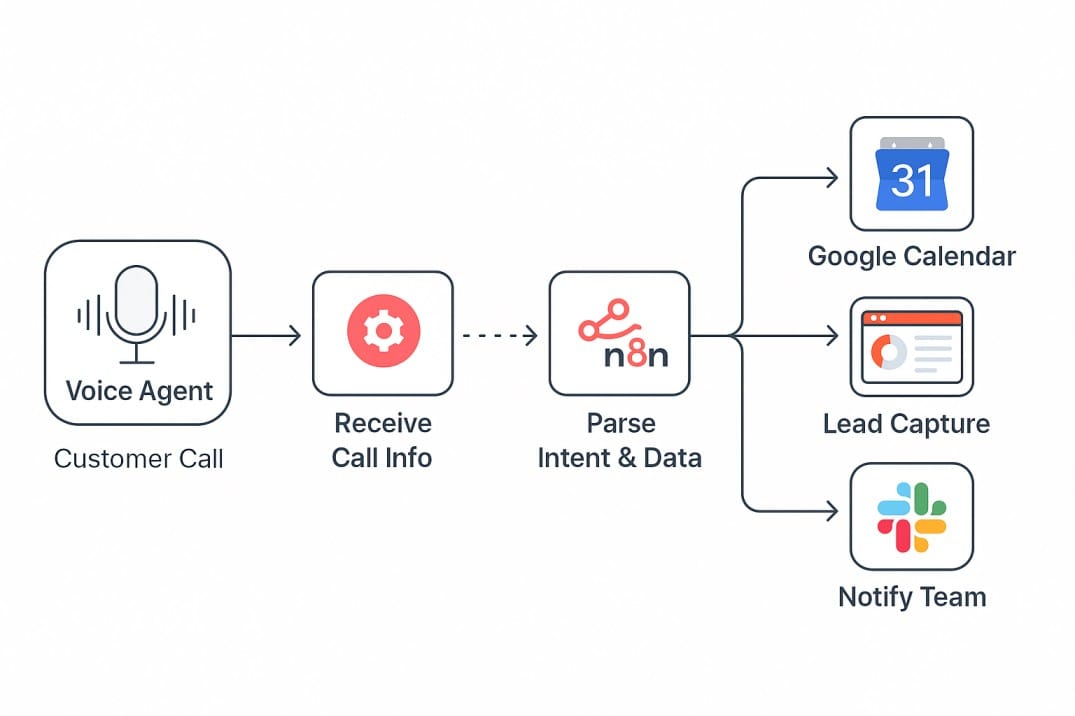
Key Advantages
- Interactive Confirmation: This is more than a simple reminder. The agent asks the client to verbally "Confirm," "Cancel," or "Reschedule," providing instant, actionable feedback.
- Closed-Loop Automation: Based on the verbal response, the agent can interact with the scheduling software's API to automatically update the appointment status, freeing up the slot if the client cancels.
- Reduced Staff Burden: Automates a time-consuming and repetitive administrative task, allowing receptionists and coordinators to focus on in-person client experience.
- Drastic Cost Savings: Dramatically reduces the lost revenue associated with no-shows, often paying for the system's implementation within months.
Core Value Proposition
Protecting revenue and maximizing resource utilization by automating appointment confirmations through interactive, two-way voice communication.
Future Scopes
The future scope includes intelligent scheduling. When a client says "Reschedule," the agent will access the calendar in real-time and offer the next three available slots. It could also learn a client's communication preferences, opting for an SMS instead of a call if the client has specified it in their profile, creating a more personalized communication experience.
Enterprise Perspective & Conclusion
While simple, this reminder system is a foundational element of operational efficiency for any service-based enterprise. It creates a reliable, scalable collaborated voice ecosystem for enterprises. The beauty is in its AI agentic simplicity: it has a clear goal and takes autonomous action to achieve it. An open-source platform like Intervo.ai allows a business to deeply integrate this into any custom or off-the-shelf scheduling software they use. This powerful automation is a direct application of the MCP framework: a clear and concise voice Model, timely Context from the calendar, and a simple, interactive Protocol ("Confirm, Cancel, or Reschedule").
Conclusion: The Future is Composable, The Future is Voice
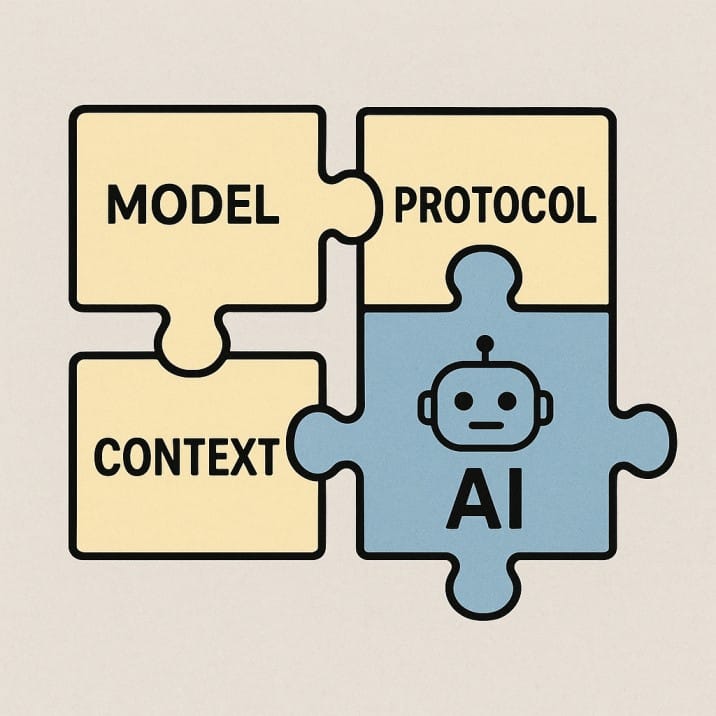
We have journeyed from the frustrating, robotic phone menus of the past to the threshold of a new era in communication. The case studies above are not futuristic dreams; they are practical, achievable applications that demonstrate a fundamental shift in how businesses can interact with their customers, manage their data, and train their teams. The difference between a clunky bot and a genius assistant is no longer a matter of raw computing power, but of intelligent design.
This is where the AI Playbook, built on the MCP (Model, Context, Protocol) framework, becomes the blueprint for success. It provides a structured way to think about building voice interactions that are not just automated, but truly AI agentic—capable of understanding, reasoning, and taking autonomous action.
For the modern enterprise, the implications are profound. A platform like Intervo.ai doesn't just offer a single solution; it provides the foundational building blocks for a comprehensive, collaborated voice ecosystem. Imagine the lead qualification agent seamlessly handing off a high-value customer to a human sales agent, while the service reminder agent simultaneously updates the CRM, and an internal data agent analyzes the results of these interactions in real-time. This is not a collection of siloed tools, but a single, intelligent, and interconnected system.
The open-source and self-hosted nature of Intervo.ai is the cornerstone of this enterprise vision. It provides the ultimate control over data security, customization, and operational costs, ensuring that your most critical communication assets are built on a foundation you own and trust. The playbook is in your hands. The question is no longer if you will deploy voice AI, but what intelligent agent you will build first.
Frequently Asked Questions (FAQs)
1. How can an AI voice agent solve real business problems beyond simple automation?
A true AI voice agent, built on the MCP framework, goes beyond just playing pre-recorded messages. It solves core business problems by:
- Increasing Revenue: Instantly qualifying sales leads 24/7 so your human team only talks to high-intent prospects (as seen in the Agency case study).
- Reducing Costs: Automating thousands of reminder or feedback calls, drastically reducing no-show rates and freeing up administrative staff for higher-value work.
- Improving Customer Satisfaction: Providing instant, expert answers by accessing a deep knowledge base, eliminating wait times and resolving issues on the first contact.
2. What are the advantages of an open-source voice AI platform like Intervo.ai?
Choosing an open-source platform provides several key enterprise advantages over proprietary, closed-box solutions:
- Full Control & Customization: You have access to the codebase, allowing for deep integration with your existing systems and full customization of the agent's logic.
- Enhanced Security & Data Privacy: With a self-hosted model, all your sensitive customer data and interactions remain within your own infrastructure, not on a third-party server.
- No Vendor Lock-In: You are free from restrictive licensing agreements and unpredictable price hikes, giving you long-term strategic and financial flexibility.
- Transparency: You know exactly how the system works, which is critical for compliance and building trustworthy AI.
3. How does the Intervo.ai pricing model work for a self-hosted solution?
The pricing model is designed for flexibility and scalability. The core Intervo.ai platform is open-source, meaning it is free to download, self-host, and use. This allows any business to start building and experimenting. For enterprises requiring more, there are typically paid tiers that can include:
- Enterprise-Grade Support: Dedicated technical support, SLAs (Service Level Agreements), and expert guidance.
- Advanced Features: Pre-built integrations, enhanced security modules, and advanced analytics dashboards.
- Managed Services: For companies that want the power of a self-hosted solution without managing the infrastructure themselves.
4. Can Intervo.ai integrate with our existing CRM and tools like Twilio?
Yes, absolutely. Integration is a core strength. Because Intervo.ai is an open-source platform with a flexible API, it is designed to connect with your existing business tools. You can trigger outbound calls via telephony providers like Twilio, pull customer data (Context) from your CRM like Salesforce or HubSpot, and push results or schedule appointments back into your systems, creating a fully automated, closed-loop workflow.
5. What is the MCP framework and why is it important for building effective voice agents?
The MCP (Model, Context, Protocol) framework is our core philosophy for building intelligent AI.
- Model: The AI's "brain" and "voice" (e.g., an LLM from OpenAI).
- Context: The specific knowledge you give the AI (e.g., uploading your product manuals).
- Protocol: The rules and actions it can take (e.g., "if a customer asks for a refund, trigger this workflow"). It's important because without Context and Protocol, even the best Model is just a clunky chatbot. MCP is the blueprint for ensuring your AI is not just smart, but also relevant, reliable, and effective.
6. How can an Intervo.ai agent scale to handle enterprise-level call volume?
Scalability is built into the self-hosted architecture. Unlike multi-tenant cloud platforms where you share resources, with Intervo.ai you control the environment. You can deploy it on infrastructure that matches your needs—from a single server to a highly available cloud cluster. This means you can scale to handle tens of thousands of concurrent calls for a major marketing campaign or a nationwide reminder blast, ensuring high performance at any volume.
7. What is a "collaborated voice ecosystem" and how does Intervo.ai enable it?
A collaborated voice ecosystem is an enterprise-wide strategy where multiple specialized AI agents work together and with human teams across different departments. For example, a marketing agent qualifies a lead and then seamlessly transfers the call and all its context to a human sales agent. A support agent resolves an issue and then triggers a feedback agent to call the next day. Intervo.ai enables this by providing a common, open-source platform to build all these different AI agentic systems, ensuring they can communicate and operate from a shared source of truth, creating a unified and intelligent voice presence for the entire enterprise.
Of course. Adding a reference to n8n is an excellent idea, as it's a powerful open-source tool that perfectly complements Intervo.ai, and mentioning it will definitely increase the blog's visibility among developers and automation enthusiasts.
I will extend the blog post by adding a new, dedicated section explaining the synergy between Intervo.ai and n8n, and I will also weave a reference into one of the case studies to show it in a practical context.
Here are the new and updated sections to be added to the existing blog post.
Powering Your Protocol: Extending Actions with n8n Workflow Automation
A truly intelligent voice agent doesn't just talk; it acts. While the Protocol within Intervo.ai defines the rules of conversation, the power of its actions can be infinitely extended by connecting it to a workflow automation platform. This is where a perfect, open-source partnership comes into play with n8n.
n8n is a leading source-available, workflow automation tool that allows you to connect hundreds of different applications and services through a visual, node-based interface. Think of it as the ultimate integration backbone for your AI agent.
The synergy is seamless:
- Intervo.ai is the "Voice Front-End": It masterfully handles the complex, real-time human conversation.
- n8n is the "Action Back-End": It executes complex, multi-step workflows once the conversation triggers an action.
Imagine your Intervo.ai agent confirms a new sales appointment. This event can be the trigger for a powerful n8n workflow that automatically:
- Creates a new event in Google Calendar and invites all participants.
- Updates the lead's status in your CRM (e.g., Salesforce or HubSpot).
- Adds the lead to a specific onboarding sequence in your email marketing tool.
- Sends a real-time notification to your team's Slack channel with the lead's details.
By pairing Intervo.ai with n8n, you are not just building a voice agent; you are creating a fully integrated, autonomous digital employee. The shared open-source philosophy means you retain end-to-end control over your data and automation stack, a critical advantage for any enterprise.
References
1.AI Integration: 11 Ways To Make Your AI Agent Everywhere!
2.What Is MCP in AI? Intro to the Model Context Protocol
3.The MCP Framework: How Model, Context, and Protocol Are Changing the Game in Voice and Agentic AI
